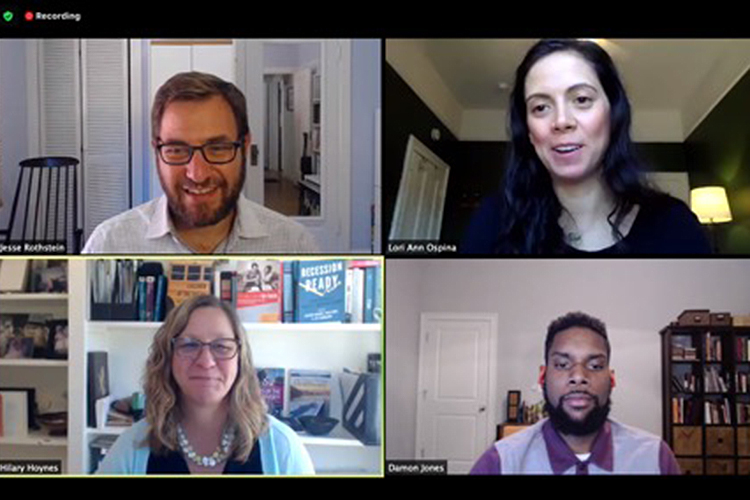COVID-19 shows fraying U.S. safety net, Berkeley scholars say
Despite strong government efforts to address economic insecurity, continued support and bold policy are essential as the pandemic continues

July 6, 2020
The COVID-19 pandemic has led to unprecedented levels of unemployment and economic uncertainty, and despite strong government efforts to address human needs, continued support and bold policy are essential for the months ahead, top scholars said during a recent event at UC Berkeley.
Nationwide, in just three months, the number of food insecure families has more than doubled, they said. Systems designed to provide temporary help to unemployed people are proving insufficient, as long-term job uncertainty persists. Recent spikes in coronavirus cases are driving new discussions about the need for additional economic stimulus legislation and the resilience of the U.S. social safety net.
The July 1 virtual conversation organized by the UC Berkeley Opportunity Lab, the Center for Effective Global Action (CEGA) and the Institute for Research on Labor and Employment (IRLE) explored those questions with three of the country’s leading researchers in economic and social welfare policy. It focused on a range of topics — from long-standing problems with our unemployment and cash assistance programs to universal basic income (UBI) and racial justice.

Speakers at the UC Berkeley Opportunity Lab online event on COVID-19 and the U.S. social safety net were Jesse Rothstein (top left); Lori Ann Ospina (moderator, top right); Damon Jones (bottom right); and Hilary Hoynes (bottom left).
Jesse Rothstein, Berkeley professor of economics and public policy and director of the California Policy Lab, began by reviewing the scale of the challenges confronting the nation. “In two months, we lost 60% more jobs than we did in the entirety of the Great Recession,” he said. “Our systems are not really set up for (a shock) like this.”
While the rapid expansion of unemployment insurance — and the extension of cash payments to families and individuals — was a strong federal response, the panelists noted that more will be needed.
Hilary Hoynes, Berkeley professor of economics and public policy and co-director of the Opportunity Lab, agreed that the initial federal response was substantial, but noted that it has nonetheless left many families vulnerable. For example, with the closure of schools around the country, the 15 million children who receive school lunches no longer have access to that source of nutrition, despite an increase in SNAP benefits to offset this loss of access.
“We’re seeing evidence of significant distress,” she observed. Hoynes’ recent research finds that, today, 23% of all U.S. households are food insecure, compared to 10% pre-pandemic, and that 30% of families with children are experiencing food insecurity.
Damon Jones, an associate professor at the Chicago Harris School of Public Policy who received his Ph.D. in economics from Berkeley, emphasized the need for rapid assistance, pointing out that those most in need tend to be those with the fewest liquid assets and drawing on research examining how households manage sudden income shocks.
“Wealth inequality is much more pronounced than income inequality,” Jones noted. “Our programs are targeted based on income … (but) it is households with the fewest (savings) that are particularly vulnerable.”
The panelists also discussed how racial inequities should inform proposals around safety net reforms. Jones, for example, said that “white households have nine to 10 times more wealth than their Black and Latinx counterparts,” who are likely to require more assistance in a crisis.
And Hoynes noted that states with higher non-white populations tend to be less generous with their safety net protections. “The only characteristic of a state that predicts how little they end up spending on cash assistance,” she said, “is the racial composition and the Black representation among low-income families in their state.”
The coronavirus pandemic has also sparked increased interest in UBI policies. The panelists, whose recent research focuses on UBI and permanent cash transfers, cautioned that the U.S. economic response to the pandemic does not necessarily give clear guidance on longer-term economic policy, which would entail resolving tough questions about financing and administering such a program.
Moving forward, the panelists agreed, short-term efforts should focus on managing the public health crisis, providing more assistance to states and extending federal relief beyond the initial round of support from the CARES Act. In the longer term, they pointed to the need to automate benefits and ensure that existing programs reach more people.
Whatever changes we make coming out of this crisis, Rothstein said, it should be a priority to move toward a system built around a stronger ethos of assistance. “A lot of the social safety net has always taken a pretty adversarial attitude toward the people who are receiving benefits,” he said. “(It) would work a lot better if it could … treat people as members of our community we want to help, rather than as people who might do something wrong.”